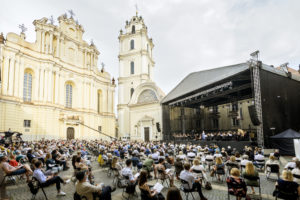
Lithuanian National Symphony Orchestra 2020 Review: Das Lied von der Erde
A Performance That Gave Everyone in Attendance A Sense of Renewal & Hope
By Polina Lyapustina“What could Mahler’s ‘Das Lied von der Erde’ might mean for the people gathered in a beautiful inner yard of Alma Mater Vilnensis on this hot summer evening?”
These were my thoughts as I entered the yard of Vilnius University. “Would it inspire them? Would it hit?”
That night would be the first large scale classical music event in Vilnius after the lockdown and it featured the Lithuanian National Symphony Orchestra under the baton of maestro Modestas Pitrėnas with Kristian Benedikt and Justina Gringytė singing.
Seats were located in lines at a distance of 1.5 meters; in total, you could probably count about 200. The event was sold out. The audience was excited and, hard to say why, looked younger. They took their places and sat silently in anticipation. Or maybe they didn’t dare to move chairs together to continue talking? People still couldn’t believe the disaster was over and many things were allowed to take place.
When the orchestra and singers have come on stage, I noticed they looked younger too. They were just as excited as their audience.
Leaving It All On Stage
The orchestra started the first movement with great enthusiasm and a deep understanding of maestro Pitrėnas’ movements. He chose faster tempi, very confident, and powerful. No two readings of a Mahler work are similar. Some are more personal, some are very precise. That’s probably why we all have our favorite Mahler’s conductors.
On this day, Modestas Pitrėnas expressed all his accumulated energy through this piece. Nothing sounded sad today and yet, his crisp reading of the score pushed emotions to the edge.
Kristian Benedikt started with a truly heroic voice and moved to a quieter sound, developing an amazing arc for the whole universe of the first song. Suddenly, I noticed people crying. I cried too. How could it be so good?
The tenor sounded extremely energized, optimistic, and uninhibited as the youth in his voice reflected on the whole world around him. He denied neither happiness nor sadness and embraced the whole scope of emotions given to him in that moment.
Kristian Benedikt is known for his solid and well-developed dramatic tenor, but today he allowed his voice to reach every peak with great flexibility. He hit his high notes with a great volume but remained nuanced and penetrating.
I remember one singer recently told me, “I would never allow myself that, but I’m so happy I had this time for my voice and simply my body to rest.” Benedikt’s performance was a living example of that idea. Despite all the anxiety and concerns over the pandemic, we had a chance to leave the pressure of our routine behind. It worked beautifully for some singers.
Justina Gringytė needed all her energy and skill to counteract with Benedikt’s own aura. The tragic movements became the heavy counterpoint allowing us a balanced world of the symphony. Her voice created its own personal and sentimental universe. She was nature herself, a rushing horse in the fourth movement — purposeful and vocally commanding. And later she brought the surprisingly tender tone in her representation of the last part. She skillfully led the orchestra through the story of living, parting, and salvation which were found in her soft but powerful pianissimos.
Rejuvenation
I looked around again. I looked to the stage. Were they all younger than people I got used to seeing in the theatres? Well, maybe, I think, they were those people. But something had changed. Who knows, they might for the first time in years or even decades come to the venue forced to wear short summer dresses. And their behaviors may have shifted because they just forgot how it must be done or simply didn’t care about the rules.
Because they couldn’t resist the desire. They forgot how it felt — live music, hot wind, beautiful voices. For everyone, it felt like this event was their first experience ever.
And that seemed to rejuvenate everyone.
“Das Lied von der Erde” wasn’t specifically chosen for this event, coinciding with the end of quarantine in Lithuania. It could have been transmitted on the web as other festival events have been. But on that day, performed live, it seemed exactly what the people needed to bring them into contact with all the excitement, sadness, relief, reflections, happiness, carelessness, and hope they fostered inside.
When the concert ended, I could hear the claps of 2,000 people in the hands of those 200. Two thousand live honors and celebrations for every and each musician on that stage, all of whom seemed equally excited to embrace this fountain of youth that is live performance.



